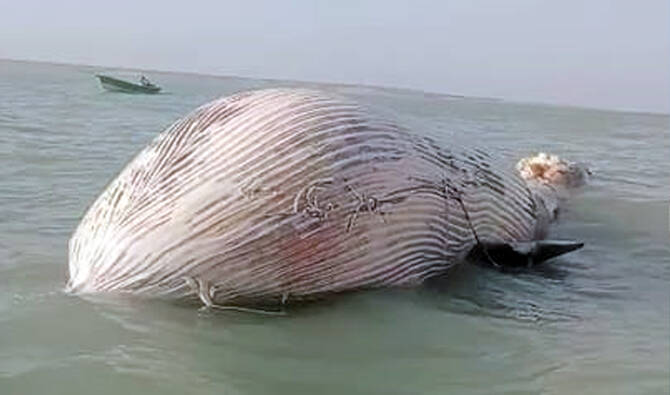By Staff Reporter
KARACHI: A rare blue whale, one of the planet’s largest and most endangered creatures, was discovered dead on Monday in a remote stretch of Gwatar Bay, straddling the maritime border between Pakistan and Iran, intensifying concerns about the mounting threats to these ocean behemoths.
The 35-foot-long whale was spotted by Ahmad Baloch, a local fisherman, floating near Kuntani in Pakistan’s southwestern Balochistan province. Though the precise cause of death remains unclear, experts suspect the animal may have succumbed to entanglement in gillnets, a common fishing tool used along the coastal and offshore waters of the region.
Authorities believe the whale likely died days earlier in the open sea, drifting into the bay under the push of rough waves and strong currents.
Blue whales (Balaenoptera musculus), the largest creatures on Earth, can stretch up to 100 feet and weigh 200 tons, consuming roughly four tons of krill daily. Yet their numbers have dwindled to an estimated 10,000 to 25,000 globally, earning them an endangered listing from the International Union for Conservation of Nature.
The World Wide Fund for Nature-Pakistan (WWF-Pakistan) sounded the alarm over the incident, noting its significance for global conservation efforts.
“A 35-foot-long blue whale was found dead in the remote Gwatar Bay area between Pakistan and Iran by a local fisherman on Monday,” the WWF-Pakistan said in a statement.
The group reiterated that while the cause of death is still under investigation, entanglement in gillnets appears a likely culprit, a hazard that has long plagued cetaceans in the region.
The whale’s relatively modest size has led some to speculate it could be a pygmy blue whale (Balaenoptera musculus brevicauda), one of four recognized subspecies and a known inhabitant of the Northern Indian Ocean. Alongside the Indian Ocean blue whale (Balaenoptera musculus indica), it joins the Bryde’s whale and Arabian humpback whale as one of three baleen whale species recorded in Pakistani waters.
Muhammad Moazzam Khan, technical adviser for WWF-Pakistan, described the loss as “sad news”.
“Muhammad Moazzam Khan… expressed concerns over the mortality of the blue whale and termed it sad news for the conservation community around the world,” the organisation said, emphasing that the loss underscores an urgent need for stronger protective measures.
Khan pointed to existing protections, noting that “all cetaceans, including whales and dolphins, are protected under the wildlife and fisheries legislations of Sindh and Balochistan provinces.”
“He also stressed to enact federal legislation for the protection of cetaceans, including whales, in the Exclusive Economic Zone of Pakistan,” the statement added.
This is not an isolated occurrence. Blue whales have appeared in Pakistani waters before, with the most recent sighting logged off Gaddani, another Balochistan coastal town, on April 8, 2024. Such encounters, while rare, highlight the region’s place in the species’ range, and its vulnerability.
WWF-Pakistan has repeatedly warned of the perils facing blue whales, listing entanglement in fishing nets, ship strikes, water pollution, and climate change as the chief dangers. Whales sit atop the marine food chain, playing a critical role in maintaining the health of ocean ecosystems, yet these threats continue to erode their numbers.
Copyright © 2021 Independent Pakistan | All rights reserved




